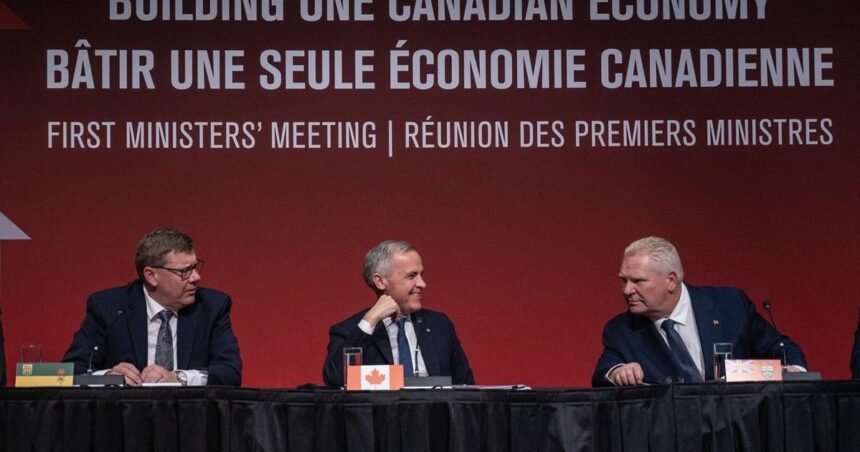The quiet of Halifax’s waterfront stands in stark contrast to the intense discussions happening inside the harbourside hotel where Canada’s premiers have gathered this week. Provincial leaders are bringing their regional concerns to the table, but trade barriers between provinces are emerging as the focal point – particularly as Ontario Premier Doug Ford makes his pitch for economic integration.
“We’re leaving billions on the table with these interprovincial trade barriers,” Ford told reporters Tuesday morning. “That’s money that could be flowing into communities across this country, creating jobs and opportunities for everyday Canadians.”
The Council of the Federation meetings, running Monday through Wednesday, come at a pivotal moment for provincial economies. Statistics Canada recently reported that interprovincial trade represents approximately $400 billion annually, yet economists at the Canada West Foundation estimate barriers between provinces cost the economy between $50-130 billion yearly.
British Columbia’s Premier David Eby arrived with a clear agenda focused on housing and healthcare but acknowledged the trade discussion couldn’t be ignored. “While we’re dealing with different regional challenges, the one thing we all agree on is that making it easier to do business across provincial borders benefits everyone,” Eby said during Monday’s opening remarks.
Quebec Premier François Legault has shown cautious openness to trade talks but maintains his province’s unique position requires special considerations. “Quebec has distinct regulatory frameworks that protect our culture and our industries,” Legault stated. “We can find ways to improve trade while respecting these differences.”
The premiers’ gathering occurs against the backdrop of recent federal-provincial tensions. The Trudeau government’s carbon pricing policies and healthcare funding formulas have created friction with several provinces, making this a rare opportunity for provincial leaders to align on economic priorities without federal involvement.
Nova Scotia Premier Tim Houston, serving as host, has focused discussions on practical steps rather than lofty declarations. “Canadians don’t need another communiqué with vague promises,” Houston told local media. “They need us to identify specific regulations and barriers we can eliminate to make life more affordable.”
For smaller provinces like Prince Edward Island and New Brunswick, the trade barriers disproportionately impact their economies. PEI Premier Dennis King brought specific examples to the table, including complications his province’s potato farmers face when selling across provincial boundaries.
“When a farmer in Summerside faces more paperwork selling to New Brunswick than to some international markets, we know the system is broken,” King said during a panel discussion I attended yesterday.
The Council meetings also highlight the shifting economic landscape as provinces navigate post-pandemic recovery. Saskatchewan and Alberta have pushed for recognition of their resource sectors’ national importance, while Ontario’s manufacturing base continues to seek new markets.
Saskatchewan Premier Scott Moe presented data showing his province exports nearly 70% of what it produces. “When we talk about internal trade barriers, we’re talking about real impacts on communities that rely on getting their products to market efficiently,” Moe explained.
Manitoba’s recently elected NDP government, represented by Premier Wab Kinew, has brought a fresh perspective to the discussions. Kinew has emphasized balancing economic growth with social responsibility. “Streamlining trade shouldn’t come at the expense of environmental protections or workers’ rights,” he stated in his first Council appearance.
The meetings have revealed interesting provincial alignments that don’t always follow partisan lines. Progressive Conservative Ford and NDP’s Eby have found common ground on reducing professional licensing barriers, allowing doctors, nurses, and skilled trades to move more freely between provinces.
A report prepared for the meetings by the Council’s Internal Trade Working Group identifies professional credential recognition as a “quick win” that could immediately address critical labor shortages in healthcare and construction sectors nationwide.
“A nurse shouldn’t have to recertify when moving from Moncton to Mississauga,” said Newfoundland and Labrador Premier Andrew Furey, who worked as an orthopedic surgeon before entering politics. “These arbitrary barriers hurt our public services and limit opportunities for workers.”
The premiers are expected to announce specific commitments on credential recognition before Wednesday’s conclusion, according to sources close to the negotiations who spoke on condition of anonymity.
Public interest in the meetings has been heightened by growing affordability concerns across the country. A recent Angus Reid poll showed 73% of Canadians believe provincial governments should prioritize reducing internal trade barriers to lower consumer costs.
What’s different about this year’s Council meeting is the absence of federal-provincial battles dominating the agenda. While premiers continue to press Ottawa for increased healthcare funding and infrastructure investments, they’ve carved out significant time for direct provincial cooperation.
This shift reflects a maturing in intergovernmental relations, according to Dr. Katherine Fierlbeck, political science professor at Dalhousie University. “We’re seeing more sophisticated policy coordination between provinces, partly because they’ve realized waiting for federal leadership on certain issues isn’t always the most effective approach,” Fierlbeck noted in an interview.
As discussions continue today, the premiers face the challenge of translating their general agreement on trade barriers into specific actions. Previous Council meetings have produced ambitious declarations that failed to materialize into regulatory changes once leaders returned to their home provinces.
The true test will come in the months following this Halifax meeting, as provincial legislatures must individually implement any agreed-upon changes. The premiers understand this challenge, with Ford acknowledging, “The hardest part isn’t agreeing here – it’s going home and getting it done.”
For everyday Canadians watching these meetings, the premiers’ ability to move beyond regional differences and find common economic ground may signal a new approach to confederation – one where provincial cooperation becomes as important as federal-provincial relations in addressing national challenges.






